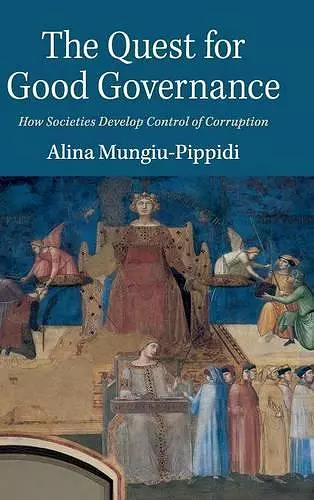The Quest for Good Governance
How Societies Develop Control of Corruption
Format:Hardback
Publisher:Cambridge University Press
Published:27th Aug '15
Currently unavailable, and unfortunately no date known when it will be back
This hardback is available in another edition too:
- Paperback£26.00(9781107534575)

A passionate examination of why international anti-corruption fails to deliver results and how we should understand and build good governance.
Why do some societies manage to control corruption so that it manifests itself only occasionally, while other societies remain systemically corrupt? This book covers historical and contemporary cases and easy-to-understand statistics to build a case for a new theory and policy approach to building non-corrupt markets and states.Why do some societies manage to control corruption so that it manifests itself only occasionally, while other societies remain systemically corrupt? This book is about how societies reach that point when integrity becomes the norm and corruption the exception in regard to how public affairs are run and public resources are allocated. It primarily asks what lessons we have learned from historical and contemporary experiences in developing corruption control, which can aid policy-makers and civil societies in steering and expediting this process. Few states now remain without either an anticorruption agency or an Ombudsman, yet no statistical evidence can be found that they actually induce progress. Using both historical and contemporary studies and easy to understand statistics, Alina Mungiu-Pippidi looks at how to diagnose, measure and change governance so that those entrusted with power and authority manage to defend public resources.
'This is one of the most important books ever written on the most universal governance challenge of our time - how to control corruption. In this brilliant integration of theory, history, case studies and quantitative evidence, Alina Mungiu-Pippidi shows how countries move from the natural state of corruption, clientelism and particularistic governance to the impersonal norms of fairness, integrity and transparency that make for good governance. This is an indispensable work for any scholar, student or policy-maker who wants to understand how societies mobilize and states reform to control corruption.' Larry Diamond, Director, Center on Democracy, Development and the Rule of Law, Stanford University, California
'Reformers who read this essential book will learn rather than seeking 'toolkits' to attack specific corrupt activities, successful societies have made integrity and accountability widely-accepted norms, backed up by the self-interest of a wide range of citizens. Alina Mungiu-Pippidi makes clear that societies which keep corruption under control have succeeded not just a due to their present laws and enforcement, but through a longer-term story of political development, widespread expectations and the building of effective performance of public institutions.' Michael Johnston, Charles A. Dana Professor of Political Science Emeritus, Colgate University
'Alina Mungiu-Pippidi uniquely straddles the worlds of theory and practice, adding to both worlds with her comprehensive perspective, honesty about what is not known, and bold speculations about the drivers of change.' Robert Klitgaard, Claremont Graduate University
'A strong argument for framing the anti-corruption debate in terms of ethical universalism and impartiality with a focus on grassroots citizen involvement. Mungiu-Pippidi realistically acknowledges the difficulty of lasting reform, but at the same time she usefully seeks to move the policy debate beyond platitudes to concrete proposals that can attract domestic support and fit local contexts.' Susan Rose-Ackerman, Henry R. Luce Professor of Law and Political Science, Yale University
'Mungiu-Pippidi writes that creating collective action and providing political support is the only proven effective strategy against corruption. Specialists will appreciate the comprehensive summary and review of the literature … Highly recommended.' R. E. Hartwig, Choice
'Mungiu-Pippidi's work is a significant contribution to our understanding of the subject, and one to which policymakers and international donors should pay attention. Her work systematically explores the failed and successful trajectories of different countries in arriving at norms of universalism in governance. It is an important work in its welcome focus on the importance of societal norms in creating and sustaining various types of political corruption, and in the finding that what matters most is not international efforts, but domestic ones … [The book] would be a welcome addition to an advanced undergraduate or graduate course on the political economy of corruption, and on the political economy of development. It should also serve as required reading for domestic and international policymakers, donors, and NGO activists concerned about corruption.' Carolyn M. Warner, Governance
'The Quest for Good Governance combines sophisticated conceptual discussion (for example, of the varying definitions of corruption and their consequences) with a historical perspective and a critical statistical analysis of various databases. It is a good example of a multi-method approach to a huge and complex problem … I find this an accomplished and important book, and one which deserves very wide readership.' Christopher Pollitt, International Review of Administrative Sciences
'Along with Tilly and Acemoglu and Robinson, Mungiu-Pippidi in this volume smartly re-frames the nature of the modern state. Elsewhere in her superbly thoughtful and conceptually enriching book, [she] focuses on how the Italian city-states in their rise to republicanism largely contained corrupt practices and, by focusing on equality, avoided the kinds of wholesale corruption that is (and has been for years) widespread in the modern Italian state. Fortunately, Mungiu-Pippidi's remarkable book provides a welcome trove of possible solutions to the historical problem of corruption.' Robert Rotberg, Journal of Interdisciplinary History
'In this bold and important book, Alina Mungiu-Pippidi seeks nothing less than to overturn received wisdom about what corruption is and how best to combat it.' Edward Aspinall, Journal of Democracy
ISBN: 9781107113923
Dimensions: 235mm x 158mm x 20mm
Weight: 590g
314 pages